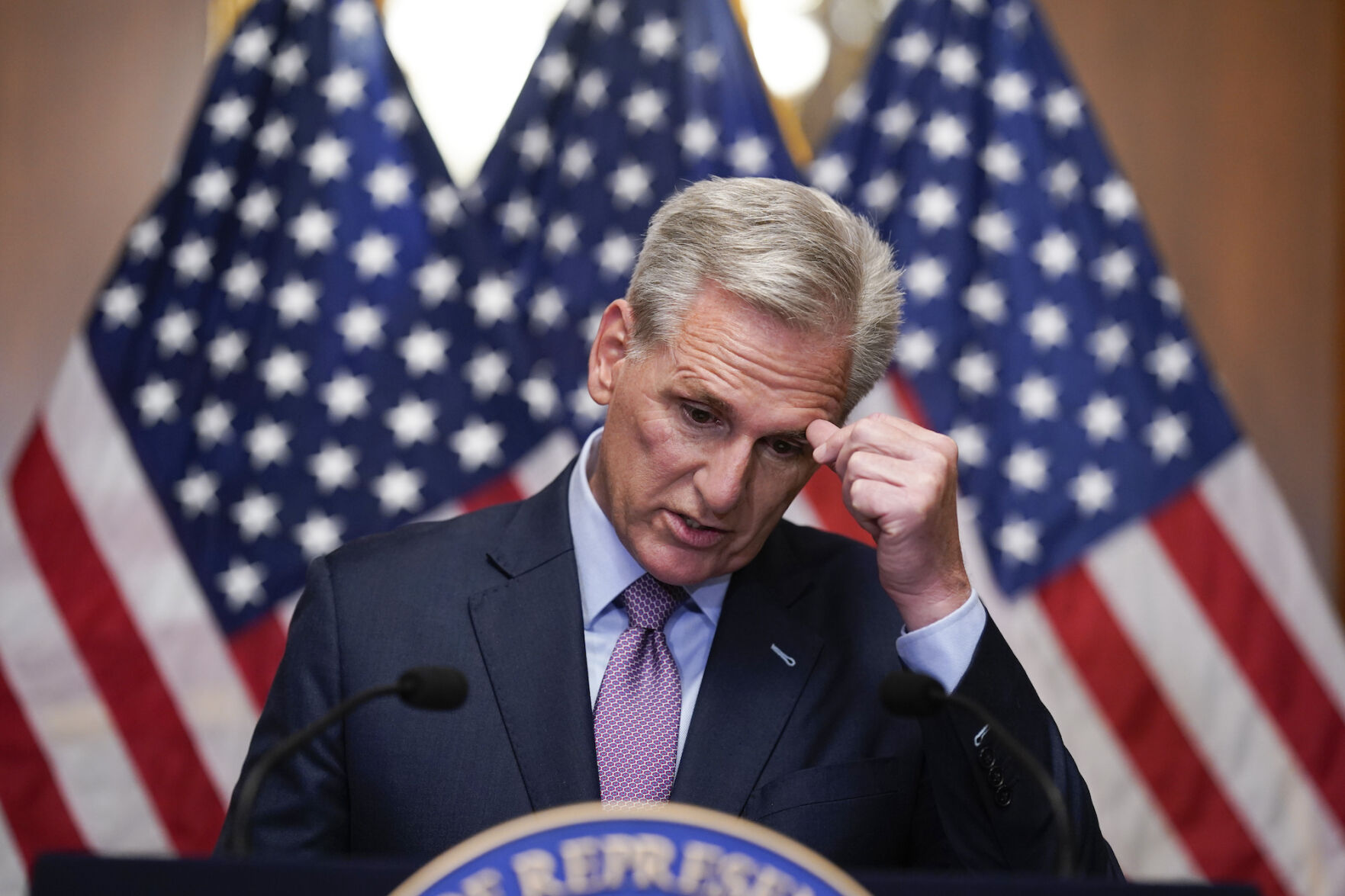Colorado lawmakers grapple with fate of speaker’s gavel in wake of McCarthy’s downfall | TRAIL MIX

In the days after a handful of dissenters broke with fellow House Republicans to strip the speaker’s gavel from Kevin McCarthy, Colorado lawmakers from both parties squared off over the direction of the suddenly leaderless chamber.
Faced with the prospect of electing a new speaker just nine months after McCarthy finally secured the post in January – on the 15th ballot, after winning over recalcitrant Republicans with a series of concessions that included allowing a single member to call for his ouster – Colorado’s GOP delegation prepared for what could be an equally charged process in the coming weeks.
Meanwhile, Democratic members of the state’s House delegation roundly rejected suggestions by some Republicans that their party was to blame for McCarthy’s downfall.
Between them, the three Colorado Republicans covered all possible bases on Oct. 3 when the House voted 216-210 to end McCarthy’s reign: in favor, against, and in a split decision, both for and against.
U.S. Rep. Ken Buck of Windsor, one of eight Republicans who joined with Democrats on Oct. 3 to remove McCarthy – the first speaker in history to be booted from the position by his colleagues, though others have been forced to step down – said the next day that he expects McCarthy’s replacement will possess something his predecessor ultimately lacked: credibility with Republicans and Democrats alike in the closely divided House.
“It should absolutely, absolutely be someone who can work across the aisle,” Buck told MSNBC. “The problem isn’t that Kevin McCarthy worked across the aisle or didn’t work across the aisle. The problem is that he didn’t have credibility on either side of the aisle. So the Democrats didn’t trust Kevin McCarthy anymore than the Republicans, and that’s why they voted the way they did.”
Buck cited as an example McCarthy’s commitment to hold a vote before initiating an impeachment inquiry aimed at President Joe Biden – after criticizing Democrat Nancy Pelosi for skipping a vote of the full House before launching the investigations that led to former President Donald Trump’s two impeachments when she was speaker.
“He promised that he would have a vote on it, and then he made an announcement because he didn’t have the votes on the floor,” Buck said. “Those kinds of things eroded his credibility. And I think that the most important thing we’re going to see in a new speaker is credibility on both sides of the aisle.”
Whoever Republicans tap to wield the gavel, Buck said, will have learned from “the McCarthy situation.”
“The next speaker will not lose credibility, will not tell people different things when they’re trying to build a coalition,” he said. “So I am very comfortable that whoever the next speaker is will have a much clearer path to building a consensus on important legislation.”
As potential McCarthy successors launched their bids or floated their names ahead of a planned Oct. 10 closed-door forum for GOP lawmakers, Buck said he planned to keep his own counsel until a full slate has emerged and the candidates make their cases. He added that an early endorsement from one of the Republicans who dethroned McCarthy might be more of a drag than a boon.
“I think the worst thing that the eight could do that voted against Speaker McCarthy is to support somebody,” Buck said. “I think that would immediately create a headwind for whoever that candidate is. So I am going to just take stock of who’s running, listen to them, and make a decision next week.”
By late on Oct. 5, just two Republicans had formally announced they wanted the job: House Majority Leader Steve Scalise of Louisiana and House Judiciary Chairman Jim Jordan of Ohio. Others let it be known they were considering a run, including former President Donald Trump – the speaker doesn’t have to be a member of the House – and U.S. Reps. Kevin Hern and Tom Cole, both of Oklahoma.
Also reserving judgement until the House GOP heard from all the speaker candidates was longtime McCarthy ally U.S. Rep. Doug Lamborn, who called the ex-speaker’s termination “an unfortunate episode in the history of the Republican Party in Congress.” Attributing the unprecedented vote to “(p)ersonal politics on the part of a few,” the Colorado Springs Republican lamented that the incident had disrupted the chamber’s work to cut federal spending in a dozen appropriations bills.
Although she voted to let McCarthy keep his job, U.S. Rep. Lauren Boebert later explained that she wanted to fire him, only not right away.
“My vote was not in support of the speaker, rather the timing of this measure,” the Silt Republican said in a statement.
Noting that she wanted to focus on pending appropriations bills rather than plunge the House into another “long, protracted speaker fight” Boebert added : “Now that Rep. McCarthy has been vacated and will not run for speaker again, we finally have a chance to elect a trustworthy speaker who can unify this conference, uphold the agreement & rules package that I helped to negotiate in January and pave the way for twelve appropriations bills that will significantly slash government spending.”
Boebert laid out stipulations for the next speaker, including maintaining a rule that allows just one House member to initiate a motion to vacate the chair, like Florida Republican Matt Gaetz had done, though a day later Boebert said she was willing to waive that requirement.
“The next speaker will need to meet the same demands that we made of Kevin McCarthy in January,” Boebert tweeted on Oct. 4. “After yesterday, it has become obvious that if they say one thing to get elected and then divert, it won’t end well.”
The next morning, after endorsing Jordan, Boebert revised her position. She noted that some fellow Republicans were insisting that keeping the rule in place would be a dealbreaker.
“I’m willing to ditch the motion To vacate with @Jim_Jordan as speaker,” Boebert tweeted. “The House has a lot of work ahead, let’s get this over with and take our country back!”
Boebert explained her about-face in response to a skeptical reply.
“There is a section of the conference that won’t vote for ANY speaker until this rule is removed,” she tweeted. “It is a mechanism based to ensure promises are kept by the speaker. I’m willing to get rid of the rule if we get a speaker who is trustworthy – and Jim Jordan is absolutely trustworthy.”
Across the aisle, Democratic U.S. Reps. Joe Neguse and Jason Crow dismissed a wave of criticism from some Republicans who argued that the opposition party had failed to come to McCarthy’s rescue, characterizing the suggestion as both unprecedented and absurd.
“It’s a nonsensical argument,” Neguse told MSNBC’s Chris Hayes on Oct. 4, the day after McCarthy got the heave-ho.
The Lafayette Democrat insisted that House Republicans had planted the seeds of the turmoil they were reaping.
“The notion that Democrats are somehow responsible for electing a Republican speaker is unmoored from reality and from any kind of historical precedents,” Neguse said. “The American people understand that, they recognize that the majority party in the House selects the speaker because they watched in January when the Republican conference was in disarray, incapable of electing a speaker, and the only reason why that process concluded with the ascension of Speaker McCarthy is because he capitulated to every demand made by the extreme right wing of his caucus, including the rule change that enabled those same chaos agents to ultimately vacate the speaker’s office. And that was a rule change that House Democrats voted against. So it’s a crisis of their own making. It is emblematic of the dysfunction that they have brought to Washington, and it’s unfortunate.”
Crow, an Aurora Democrat, told MSNBC earlier the same day that GOP lawmakers complaining that Democrats had dropped the ball were mistaken.
“This narrative that Democrats refused to give a lifeline, that’s just not true,” Crow said. “Kevin McCarthy didn’t ask for a lifeline, he didn’t reach out, didn’t ask for support. In fact, in the days leading up to this vote, he repudiated Democrats and said good riddance, he doesn’t need their support. So there was never an olive branch extended, never an opportunity for us to even have that discussion in the first instance, which, frankly, is what happened the last nine months over and over again, pushing us away and refusing to work in a bipartisan way.”
Crow added that the Republicans’ choice to take over as speaker would be “very telling.”
“The Republican conference (in) the last nine months has chosen extremism, has chosen to placate the most extreme voices and elements of their party, instead of choosing bipartisanship and governing,” he said. “So they have a choice to make right now. Are they going to continue to do what they’ve been doing the last nine months – in which case we have no reason to believe that the outcomes will be any different than they’ve been the last nine months – or are we going to change things, are we going to actually try to create a governing coalition, a bipartisan Congress that can get things done? That is the choice that’s before the Republican Conference right now.”
Republicans say they hope to reach a consensus on a speaker candidate after returning to Washington on Oct. 10. Skeptics note that McCarthy was the consensus pick in January, but still took four days and 15 votes to get the gavel.
Ernest Luning has covered politics for Colorado Politics and its predecessor publication, The Colorado Statesman, since 2009. He’s analyzed the exploits, foibles and history of state campaigns and politicians since 2018 in the weekly Trail Mix column.














